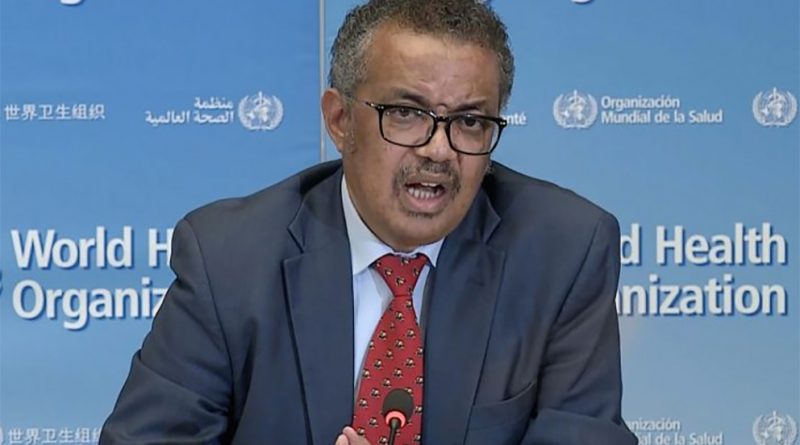OMS advierte sobre riesgo de covid en concentraciones contra racismo / WHO warns most people still at risk of coronavirus infection as mass rallies resume worldwide
La Organización Mundial de la Salud (OMS) advirtió hoy que «la complacencia es la mayor amenaza» para los países que están superando la pandemia y advirtió del riesgo de nuevas oleadas en lugares donde se están produciendo concentraciones de personas, en particular las protestas contra el racismo.
«Debemos seguir atentos para que no haya nuevas oleadas, sobre todo porque las concentraciones de gentes se están reanudando en muchos países», dijo el director general de la OMS, Tedros Adhanom Ghebreyesus, en su rueda de prensa regular para informar de la evolución de la pandemia.
«La OMS apoya la igualdad y el movimiento global contra el racismo y alentamos a los que protestan alrededor del mundo a que lo hagan de una forma segura. Tanto como sea posible, mantengan al menos un metro de distancia de los demás, lávense las manos y lleven una máscara si participan», recomendó el jefe la OMS.
El responsable operacional de la lucha contra el covid-19, Mike Ryan, recordó que para que haya contagio se requiere haber estado en contacto prolongado con una persona enferma y que, en principio, en manifestaciones multitudinarias «no se cumple la definición de contacto».
«El riesgo está en la cercanía con persona con síntomas. Esas personas no deben acudir a ningún tipo de actividad púbica», enfatizó.
Ryan, director del Departamento de Emergencias Sanitarias en la OMS, recalcó que la gestión del riesgo sanitario corresponde a las autoridades de cada lugar donde se producen las concentraciones.
Tedros comentó que el mundo está ya seis meses inmerso en la pandemia de coronavirus y que «éste no es el momento de quitar el pie del acelerador».

WHO warns most people still at risk of coronavirus infection as mass rallies resume worldwide
The World Health Organization said on Monday that most people around the world were still at risk of becoming infected with coronaviruses and that the greatest threat of continued spread was complacency, as mass rallies resumed in countries around the world.
The coronavirus pandemic is worsening around the world as the number of new Covid-19 cases reached an all-time high on Sunday, said WHO Director-General Tedros Adhanom Ghebreyesus at a conference press at the agency’s headquarters in Geneva.
He said that almost 75% of the cases came from 10 countries, mainly in the Americas and South Asia
“I would say that at this time the epidemic in Central and South America is the most complex of all the situations we face in the world,” said Dr. Mike Ryan, executive director of the program. WHO emergency
While WHO is “encouraged” that some countries are starting to see signs of improvement, research shows that most people are still at risk of contracting Covid-19, said Tedros.
“In these countries, the biggest threat is now complacency,” he said. “We continue to urge active surveillance to ensure that the virus does not rebound, especially since mass gatherings of all kinds are starting to resume in some countries. ”
WHO officials have said that most African countries are still experiencing an increase in Covid-19 cases. Ryan said health officials have had time to prepare for an epidemic because cases in Africa have not grown exponentially.
“This does not mean that the disease cannot explode and that it cannot increase significantly in Africa and cause significant destruction and death,” he said.
In the United States, where George Floyd’s death in police custody has sparked outrage and protests have drawn large crowds in cities across the country, WHO said it supports the global movement against racism, but encouraged the protesters to do so safely.
Coronavirus cases in the United States have slowly started to improve since the Memorial Day vacation, according to a CNBC analysis of data compiled by Johns Hopkins University. Some public health and infectious disease experts have warned that recent mass rallies across the country are likely to result in a second wave of Covid-19 infections this fall.
Dr Maria Van Kerkhove, Head of WHO’s Emerging Diseases and Zoonoses Unit, said it is important that whole populations remain engaged to prevent the spread of Covid-19 and protect the most vulnerable serious illnesses.
“The idea that we have an entire population engaged, knowing what role each individual plays during this pandemic, is fundamental,” said Kerkhove.
In late May, President Donald Trump announced that the United States would cut ties with the World Health Organization and end its funding. He has repeatedly criticized the WHO response to the coronavirus, which has hit the United States worse than any other country.
WHO, however, continues to collaborate with its American colleagues at the Centers for Disease Control and Prevention and the National Institutes of Health, as well as with a number of academic institutions, and “this will continue,” said Kerkhove.
“It is extremely important to watch out for and respond to these emerging diseases quickly, and we rely heavily on our colleagues and institutions in the United States, like the CDC, like the NIH, and like the hundreds of collaborating centers that organization has across the United States, “said Ryan.


Debe estar conectado para enviar un comentario.